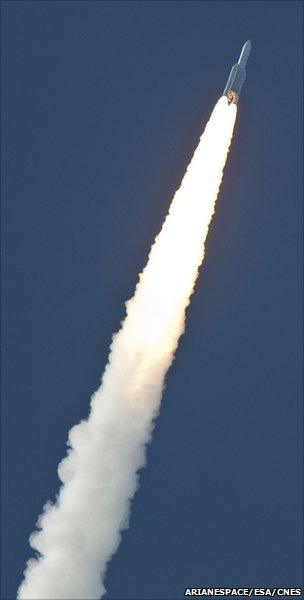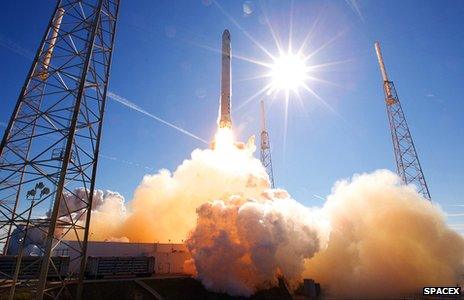SpaceX CEO Elon Musk: Europe's rocket 'has no chance'
- Published
Elon Musk talking to the BBC's science correspondent Jonathan Amos
The Californian SpaceX chief executive Elon Musk has warned Europe it must replace its Ariane 5 rocket if it wants to keep up with his company.
The low prices the US entrepreneur is quoting for his new Falcon 9 vehicle mean it is winning contracts that in the past would have gone to Ariane.
Mr Musk said that the cost of producing the current European rocket would kill it as a commercial entity.
"Ariane 5 has no chance," he told BBC News.
"I don't say that with a sense of bravado but there's really no way for that vehicle to compete with Falcon 9 and Falcon Heavy. If I were in the position of Ariane, I would really push for an Ariane 6."
Ariane's future will be a key topic this week for European Space Agency (Esa) member states.
They are meeting in Naples to determine the scope and funding of the organisation's projects in the next few years, and the status of their big rocket will be central to those discussions.

Ariane 5 is extremely reliable and accurate, but it is also costly to produce
Although its great reliability has helped Ariane achieve a level of dominance in the global market for the launch of large telecommunications satellites, the rocket still requires subsidy from Esa nations. Support payments totalling 217m euros have been agreed for the years 2011 and 2012.
SpaceX's Falcon is a new entrant to the launcher market. It has so far made only four flights, but it has a backlog already of more than 40 contracted launches. Its quoted price under $60m per flight is proving highly attractive to satellite operators who have to pay substantially more to get on an Ariane.
"Not only can we sustain the prices, but the next version of Falcon 9 is actually able to go to a lower price," warned Mr Musk.
"So if Ariane can't compete with the current Falcon 9, it sure as hell can't compete with the next one."
The SpaceX CEO and chief designer was speaking at the Royal Aeronautical Society where he was being awarded a gold medal for his work to advance the commercialisation of space.
Esa member states recognise that aggressive competition from the likes of SpaceX demands Europe reduce the cost of the Ariane product, but there is deadlock over how that should be achieved.
France, which has traditionally led the launcher effort in Europe, wants development on a next-generation Ariane - often dubbed Ariane 6 - to start immediately. This would incorporate cheaper components and fabrication methods.
But Germany, the other major player within Esa, wants the current vehicle upgraded first before moving to a completely fresh design.
The upgrade - known as Ariane 5ME (Mid-Life Evolution) - would introduce a more powerful upper-stage engine. This would also be re-ignitable.
The changes would enable Ariane 5 to better optimise its payload capacity for heavier, more lucrative customers; and also to offer a broader range of orbits to those clients.
Germany argues too that moving first to Ariane 5ME would reduce the cost of implementing the eventual Ariane 6.
"If we are smart enough we can use commonalities between Ariane 5ME and Ariane 6 to reduce the amount of money we need [to develop] Ariane 6," explained Prof Jan Woerner, the chairman of the German space agency (DLR).
"For instance, the best one would be to have a common upper-stage on both vehicles. It's a synergistic approach and that makes it cheaper. It's also cheaper because you are reducing the exploitation costs earlier," he told BBC News.
Commentators expect there to be a consolidation in the launcher market soon.
Orders may have been buoyant recently - a consequence of the fact that many satellite owners are in the process of upgrading their fleets - but most observers forecast leaner times ahead.
There are likely to be too many rockets chasing the available launch contracts later this decade.
Sceptics of the SpaceX model have questioned whether the Californian company can maintain its prices long term, or indeed the quality and reliability of its rockets when the launch rate has to ramp up to meet the demands of its backlog. Eyebrows were raised when the most recent Falcon 9 flight experienced a failure in one of the nine Merlin engines that powers the rocket's first stage, and SpaceX will soon have to produce large numbers of these engines to fulfil its launch cadence.
But Mr Musk believes increased production can only be a plus.
"As you increase the volume of production and you have more test firings and more flights, you're able to increase the statistical reliability of the engines because you see all the issues; you see all the corner cases and odd things here and there where you have so many engines being produced and flown," he said.
"[It will get to be] like the great Merlin that powered the Spitfire, which was an awesome engine, and made in high quantities and did an amazing job. They had enormous amounts of flight time on that engine and that's actually how you increase reliability."

The Falcon 9 has a backlog of more than 40 launch contracts to fulfil
Jonathan.Amos-INTERNET@bbc.co.uk and follow me on Twitter: @BBCAmos, external
- Published28 October 2012
- Published3 August 2012
- Published22 September 2011
- Published25 June 2011
- Published18 March 2011